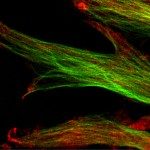Lien vers Pubmed [PMID] – 11092869
J. Bacteriol. 2000 Dec;182(24):7060-6
We describe a genetic system that allows in vivo screening or selection of site-specific proteases and of their cognate-specific inhibitors in Escherichia coli. This genetic test is based on the specific proteolysis of a signaling enzyme, the adenylate cyclase (AC) of Bordetella pertussis. As a model system we used the human immunodeficiency virus (HIV) protease. When an HIV protease processing site, p5, was inserted in frame into the AC polypeptide, the resulting ACp5 protein retained enzymatic activity and, when expressed in an E. coli cya strain, restored the Cya(+) phenotype. The HIV protease coexpressed in the same cells resulted in cleavage and inactivation of ACp5; the cells became Cya(-). When the entire HIV protease, including its adjacent processing sites, was inserted into the AC polypeptide, the resulting AC-HIV-Pr fusion protein, expressed in E. coli cya, was autoproteolysed and inactivated: the cells displayed Cya(-) phenotype. In the presence of the protease inhibitor indinavir or saquinavir, AC-HIV-Pr autoproteolysis was inhibited and the AC activity of the fusion protein was preserved; the cells were Cya(+). Protease variants resistant to particular inhibitors could be easily distinguished from the wild type, as the cells displayed a Cya(-) phenotype in the presence of these inhibitors. This genetic test could represent a powerful approach to screen for new proteolytic activities and for novel protease inhibitors. It could also be used to detect in patients undergoing highly active antiretroviral therapy the emergence of HIV variants harboring antiprotease-resistant proteases.

